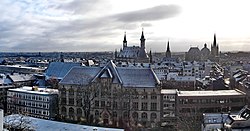Aachen, Germany
| Aachen | |||
|---|---|---|---|

|
|||
|
|||
| Coordinates: 50°47′N 6°5′E / 50.783°N 6.083°ECoordinates: 50°47′N 6°5′E / 50.783°N 6.083°E | |||
| Country | Germany | ||
| State | North Rhine-Westphalia | ||
| Admin. region | Cologne | ||
| District | Aachen | ||
| Government | |||
| • Lord Mayor | Marcel Philipp (CDU) | ||
| • Governing parties | CDU / SPD | ||
| Area | |||
| • Total | 160.85 km2 (62.10 sq mi) | ||
| Elevation | 266 m (873 ft) | ||
| Population (2015-12-31) | |||
| • Total | 245,885 | ||
| • Density | 1,500/km2 (4,000/sq mi) | ||
| Time zone | CET/CEST (UTC+1/+2) | ||
| Postal codes | 52062–52080 | ||
| Dialling codes | 0241 / 02405 / 02407 / 02408 | ||
| Vehicle registration | AC / MON | ||
| Website | aachen |
||
| Largest groups of foreign residents | |
|---|---|
| Nationality | Population (2013) |
|
|
6,478 |
|
|
1,758 |
|
|
1,651 |
|
|
1,586 |
|
|
1,512 |
|
|
1,025 |
Aachen (German pronunciation: [ˈʔaːxn̩]) or Bad Aachen, traditionally known in English and French as Aix-la-Chapelle (French pronunciation: [ɛks.lɑ.ʃɑ.pɛl]), is a spa and border city in North Rhine-Westphalia, Germany. Aachen was the preferred residence of Charlemagne, and, from 936 to 1531, the place where 31 Holy Roman Emperors were crowned Kings of the Germans.
Aachen is the westernmost city in Germany, located near the borders with Belgium and the Netherlands, 61 km (38 mi) west south west of Cologne in a former coal-mining area.RWTH Aachen University is located in the city. Aachen's industries include science, engineering and information technology. In 2009, Aachen was ranked eighth among cities in Germany for innovation.
The name "Aachen" is a modern descendant, like southern German Ach(e), Aach, meaning "river" or "stream", from Old High German ahha, meaning "water" or "stream", which directly translates (and etymologically corresponds to) Latin Aquae, referring to the springs. The location has been inhabited by humans since the Neolithic era, about 5,000 years ago, attracted to its warm mineral springs. Latin Aquae figures in Aachen's Roman name Aquae granni, which meant "waters of Grannus", referring to the Celtic god of healing who was worshipped at the springs. This word became Åxhe in Walloon and Aix in French, and subsequently Aix-la-Chapelle after Charlemagne had a cathedral built there in the late eighth century and then made the city his empire's capital.
...
Wikipedia




